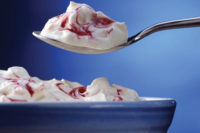
Fluid milk processors have more options than ever when it comes to producing fruit juices and drinks. Ingredient suppliers make it simple to bottle everything from bug juice to super-fortified OJ.
For example, SensoryEffects Flavor Systems, Bridgeton, Mo., manufactures turn-key beverage base systems containing 0% to 100% juice. Two new items have recently been added to meet consumer demand for value-added fruit drinks.
Fruggie Carrot Mangosteen and Fruggie Brainberry (pomegranate, cherry, purple carrot and beet) are 35-times-concentrated liquid bases. “The dairy processor simply adds water and sweetener to make a nutritious fruit and vegetable blended juice drink,” says Mike Smith, food scientist. “Both bases contain 10% juice. Each 8-ounce serving is an excellent source of antioxidant vitamins A, C and E.
“We also offer other value-added bases that are fortified with vitamin D or calcium,” Smith says. “There are even calorie-reduced juice drink bases sweetened with all-natural, calorie-free stevia.”
Allen Flavors Inc., Edison, N.J., works with many dairies to find just the right blend of today’s superfruits like acai from South America, Indian gooseberry, goji berry or the legendary yangmei (yum berry) from Asia. “Of course, we are familiar with the superfruits of yesterday, the cranberry, blueberry, pomegranate and kiwi, too,” says John Wilson, marketing and sales coordinator. “Vitamins, antioxidants, minerals, fiber and many other phytonutrients can be incorporated with no adverse affect in flavor or color.
“Our juice blends and juice cocktails can be shipped at various concentrations,” Wilson adds. “While our 10% juice-based drinks are concentrated at 50:1, lesser percentages of juice are available at 100:1 and 200:1. Efficient packaging may be tailored for each dairy’s required batch size. Documented rehydration procedures are always provided, as well as nutrition panels for the end product.”

Super new products
Recently, Ocean Spray, Lakeville-Middleboro, Mass., welcomed the powerful pomegranate to its family of juices and juice drinks. In April the company rolled out regular, light and diet Cranberry Pomegranate Juice Drinks and Ruby Pomegranate Juice Drink.“There has been a growing buzz about pomegranate over the last few years due to research on its antioxidant properties - but still, a lot of consumers aren’t familiar with this delicious and unique fruit,” says Ken Romanzi, chief operating officer of Ocean Spray. “So we’re excited to bring pomegranate mainstream and unite it with our two superfruits, cranberries and grapefruit, to create delicious and good-for-you juices.”
All three nutrient-rich fruits are known as excellent sources of antioxidants. Cranberries are unique as they are loaded with proanthocyanins, which are believed to help maintain health by preventing certain harmful bacteria from sticking in the urinary tract, mouth and stomach.
There’s another new super juice in the marketplace: Drenchers Fit ‘N Lean Heart Healthy super juice beverage. Each 8-ounce serving contains two servings of fruits, as well as the company’s proprietary Bodyguard, a fortification package of 15-plus essential vitamins, nutrients, amino acids, electrolytes and herbs.
“Our customers always want something different and Drenchers Fit ‘N Lean Heart Healthy fits the bill. It does what the label says. It helps make your heart healthy,” says Chris New, founder, chairman and chief executive officer of NBI Juiceworks, Fort Lauderdale, Fla. “Fit ‘N Lean Heart Healthy has only 10 calories per serving, is customized with powerful vitamins and nutrients and has a taste that people love.”
Trend toward reduced sweetness
Strong evidence developed at Harvard School of Public Health (HSPH), Boston, and elsewhere shows that sugary drinks are an important contributor to the epidemic rise of obesity and type-2 diabetes in the United States. Faced with these growing public health threats, experts from the Department of Nutrition at HSPH believe beverage manufacturers, government, schools, worksites and homes must take action to help Americans choose healthier drinks. They propose that manufacturers create a class of reduced-calorie beverages that have no more than one gram of sugar per ounce - about 70% less sugar than a typical soft drink - and that are free of non-caloric sweeteners. They also propose that FDA require beverage manufacturers to put calorie information for the entire bottle - not just for a single serving - on the front of drink labels. The aim is to re-educate the American palate to a lower expectation of sweetness, as well as to give consumers clear information to help them make healthier choices.“The scientific evidence is now clear; soda and other sugar-sweetened beverages are important contributors to obesity in children and adults,” says Walter Willett, professor and chair of the Department of Nutrition at HSPH. “Healthier beverage options would allow individuals to make better choices.”
Americans consume sugary beverages in staggering amounts. On a typical day, four out of five children and two out of three adults drink sugar-sweetened beverages. Teen boys drink more than a quart of sugary drinks, on average, every day. A 12-ounce can of soda or juice typically has 10 to 12 teaspoons of sugar and 150 or more calories; the popular 20-ounce bottle size now prevalent on store shelves and in vending machines carries nearly 17 teaspoons of sugar and 250 calories.
Consuming sugary drinks may have other harmful health outcomes. The latest research from HSPH published in the April issue of the American Journal of Clinical Nutrition, followed the health of 90,000 women over two decades and found that women who drank more than two servings of sugary beverages each day had a nearly 40% higher risk of heart disease than women who rarely drank sugary beverages.
Willett and his colleagues understand that people will not be able to kick their sugar-drink habit overnight. Therefore, they believe that Americans need to lower their sugar expectations.
“We need to retrain American tastes away from super-sweet drinks,” says Lilian Cheung, lecturer in the HSPH Department of Nutrition. “If we can shift the present American norm back to a lower expectation of sweetness, people will adjust their palates, particularly the younger population.”
